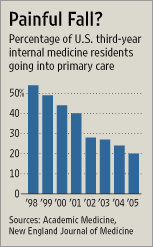Doctors More Likely to Prescribe Advertised Drugs
Consumer Ads Boost Doctors’ Scripts -Study (Reuters Health)
Direct-to-consumer advertising of prescription drugs seems to increase the likelihood that physicians will prescribe those drugs, according to a study in the April 27th issue of the Journal of the American Medical Association. This can have mixed results in patient care, averting underuse in some cases and promoting overuse in others.
To ascertain the effects of patients’ requests influenced by direct-to-consumer advertising, Dr. Richard L. Kravitz, of the University of California, Davis, and colleagues used “standardized patients,” actors trained to present at primary care physicians’ offices with symptoms consistent with one of two conditions, major depression or adjustment disorder. The standardized patients, who were all nonobese, middle-age women, requested a brand-name medication (Paxil), made a general request for antidepressant treatment, or made no request at all. Altogether, the patients made 298 visits to 152 physicians between 2003 and 2004.
In the major depression visits, in 80 of 149 visits (54 percent) antidepressants were prescribed. Rates of antidepressant prescribing were 53 percent in the brand-specific group, 76 percent in the general request group, and 31 percent in the group making no request. Paroxetine (Paxil) was prescribed in 3 percent of cases, except for the 27 percent of cases where Paxil was requested by name. Treatment considered “minimally acceptable” — antidepressant prescription, mental health referral or follow-up within 2 weeks — was administered to 90 percent to 98 percent of those who suggested medication, versus 56 percent of those making no suggestion.
Among the patients presenting with symptoms of adjustment disorder, for whom the authors note antidepressant medication is not generally indicated, the drugs were prescribed in 51 out of 149 visits (34 percent). This included 55 percent of those asking for Paxil, 39 percent of those making a general request, and 10 percent of those making no request.
“These results send a clear message that direct-to-consumer advertising is an effective but extremely blunt instrument,” Kravitz said in an interview with Reuters Health.
While perhaps disturbing, this is hardly surprising. Doctors are, to some extent, in the customer service business. When patients are insistent on leaving with a prescription, physicians are more likely to prescribe something.
Further, a lot of symptoms have mulitple possible solutions. If a patient comes in emphasizing a disease consistent with those symptoms, and suggests a treatment that’s reasonable, it’s not surprising that doctors will be somewhat more likely to go along than if left to make a decision from a wider range of options.






1. Congress passed the law permitting drug companies to advertise drugs.
2. A large portion of the drug company “pie” goes to advertising.
3. Prescription drug prices have risen.
NOW WHAT DON’T WE UNDERSTAND?
As usual Congress lined their political coffers, and the American citizen PAID!
The problem is that doctors of medicine have a government-granted monopoly on prescribing drugs. This monopoly was granted at least in part because doctors are considered to be professionals rather than simple medical retailers. This study highlights the need to re-think our system from stem to stern.
Well, remember, the docs aren’t SELLING the drugs, merely prescribing them. They don’t make any money from writing the scripts, other than to the extent that making patients happy keeps them coming back.
In some (most?) states, PAs and others can write certain kinds of prescriptions, too.
I do not ask my doctor to prescribe on a whim; I do reasearch and I have many years experience with many medications. Therefore, unless he can convince me that I am wrong, I expect him to prescribe what I want. And frankly, if I want advertised drugs versus other brands, that is my own business and mine alone.